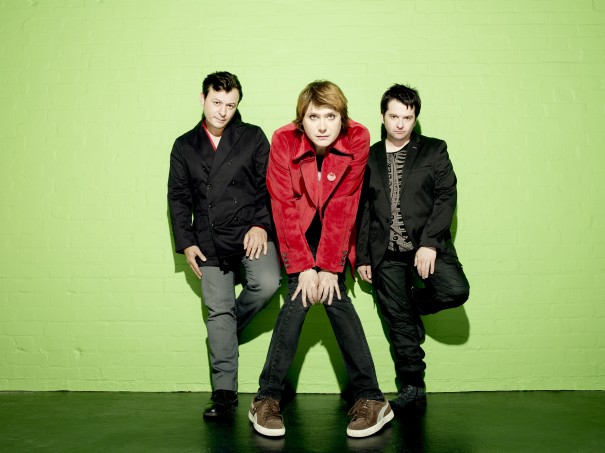Manic Street Preachers could’ve been wilfully obscure as their often confronting topics are on Postcards From A Young Man – their tenth album in 24 years.
Manic Street Preachers could’ve been wilfully obscure as their often confronting topics are on Postcards From A Young Man – their tenth album in 24 years. Yet their tales of degenerative disease, a sold-out Britain and obsession with a virtual-world are instead served up with sweet cock-rock riffing, big choruses and orchestras. Initially these Welsh socialist, occasional glam-punks were a reaction to mindless stadium rock – and not much has changed in that regard – but now they’re back to using the platform of rock to critique our floundering humility and humanity.
Promotion of their latest album has been unusually high for the Manics (as their loyal fanbase call them). Their post-millennium releases have suffered from a growing indifference, but it seems they are determined that Postcards From A Young Man won’t suffer the same fate. It’s been 11 years since the trio toured Australia, so anticipation is high, but chatting to drummer/trumpet/player-cum-co-writer, Sean Moore, it becomes clear that such anticipation can be brutal.
Backstage at the BBC, pre-warm up for the Manic Street Preachers’ appearance on Later With Jools Holland, Moore whispers, “It’s Holland’s 250th show, so it’s going to be a big one,” he begins, drawing a sharp breath. “I just saw Phil Collins in the hall and Klaxons are here…” He pauses as there’s a knock on his dressing room door. “I better get that… It’s okay, it’s only my breakfast.” Moore doesn’t like doing live TV, and the arrival of his first meal of the day is a greater relief than usual. “Sorry, I was expecting to be hauled out to do rehearsal then,” he says with a nervous laugh. “I do find live television extremely nerve-racking. It always puts me on edge.”
As it’s a landmark show for Jools Holland, he’s pulled out all the stops and employed a full choir and string section to back the Manics. Their new album, Postcards From A Young Man, is a heavily layered set, bursting with anthemic numbers, avoiding introspection. It’s been described by the group’s bassist and writer Nicky Wire as “their last shot at getting on the radio” following a lacklustre response to their previous three albums. The Manics have never sat easily on radio playlists, so a battle-plan was drawn up to get their message out to as many listeners as possible by dressing up their already solid tunes and calling in some help from their peers. “We asked Ian McCulloch, John Cale and Duff McKagan to play on the album because we’re fulfilling a lot of our boyhood dreams this time around,” Sean states. “Echo & The Bunnymen was the first gig we all went to see, and my first album was Porcupine.”
Arguably, the antithesis of the Manics were the old, misogyny-peddling Guns ‘N’ Roses, which makes the appearance of ex-Gunner’s bassist Duff McKagan (on A Billion Balconies Facing The Sun) seem all the more strange. “In a way, you’re right,” Sean admits, “but at the same time Guns ‘N’ Roses introduced James (Dean Bradfield) and Richey (Edwards) to rock music,” he reasons. “Whereas Nick was more into Rush, for me AC/DC was about as heavy as it got,” he laughs.
Childhood heroes guesting, choirs and a symphony orchestra could all easily be seen as unduly ambitious, but the album was designed to be a sharp turn away from 2009’s bleak Journal For Plague Lovers. As Sean confirms, “This album and Journal For Plague Lovers are basically Jekyll and Hyde,” he nods. “Recording Postcards… was quite easy by comparison. We had our objective and we stayed put until we’d seen it through, whereas Plague Lovers was a collection of Richey’s old lyrics that we built music around and it became a kind of Holy Bible part 2.”
Indeed, in 2008, ‘deceased’ was the official outcome finally reached following the unsolved 1995 disappearance of Richey Edwards, the Manic’s troubled guitarist/writer. The last album Edwards’ made with the band – 1994’s The Holy Bible – was a disturbing, nightmarish romp through some of humanity’s darkest moments in history. The latest release, much like Holy Bible, is only the second by the Manics to follow a dense, Richey-penned record. Sean discusses this, noting “We were quite aware of following up that album with something much brighter, as we did (follow-up The Holy Bible) with Everything Must Go (in 1996). We did two or three albums of that nature – heavy, Richey albums – but you really can’t do that every time. If we did, I don’t think I’d be speaking to you now,” Sean says ominously. “We have always said that we want to be heard by as many people as possible because we feel we have something worthwhile to say.”
All Manics albums are angry at something; debut Generation Terrorists (1991), was probably the truest example of a punk record released in many years. As they grew, that anger was refined and a few favourite targets emerged; Americanisation, consumerism and dodgy politics, yet the Manics never patronised their fans; they presume the listener to be curious, informed, or wishing to be challenged, but Sean understands the songs don’t always translate. “I wouldn’t want to be in a band making music that meant nothing to people, and I get that people don’t always see the meaning in our songs… but when they do it feels like we’ve achieved something.” Moore adds, “We were criticised for being too flamboyant in the past, and for having ‘overly wordy’ songs, but sometimes I think you need music that goes that bit further than just rocking out.”
Carrying on that tradition, the new album is themed around the digital age’s possible consequences for humanity, and a longing for more innocent times. “The title refers to more tactile forms of communication which have all but been replaced by things like e-mail and social networking,” Sean explains. “It’s very easy to gain information about a person, but any kind of personal touch is fading away rapidly.”
The cover image features actor Tim Roth (Lie To Me, Reservoir Dogs) shirtless, his face mostly obscured as he takes a Polaroid picture. The dated photo summarises beautifully the tactile world to which Sean refers – Roth as he was 20-odd years ago embracing a long-lost artefact. “It’s just something that harks back to when we were young, I suppose, when you had to sort of maintain and care for the condition of a record or a photo. Now digital images and mp3s are forever frozen in a kind of stable perfection, and none of these things have a chance to wear.”
He sighs.
“But we still like the strange beauty of seeing tangible objects gradually fray at the edges.”
The new MANIC STREET PREACHERS album, Postcards From A Young Man is out now through Sony.

